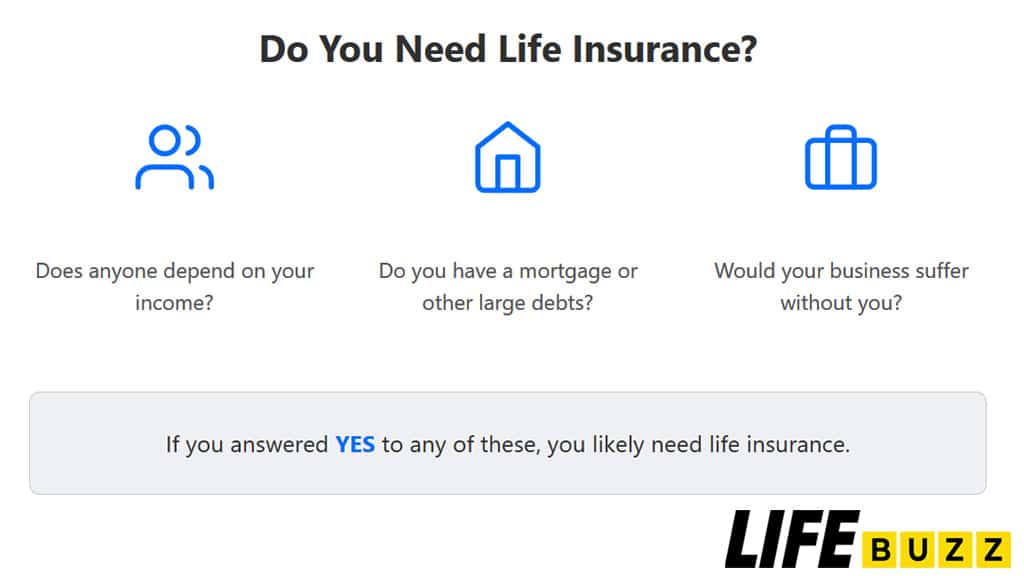Life insurance can seem confusing, with all the policy options and factors to weigh. But at its core, it’s actually pretty simple – life insurance provides money to your family if you pass away unexpectedly.
So, do you need life insurance? Let’s walk through some key questions to help you decide if life insurance deserves a place in your financial plan.
Who Needs Life Insurance the Most?

When people think about life insurance, they often assume it’s only for older adults or those with dependents, but the truth might surprise you. So, do you know who actually needs life insurance the most? Take a look at the real-life situations below.
Parents with Minor Children
If you’re a parent with kids under 18, having life insurance coverage in place is absolutely critical. Your top priority when you have children is making sure they will always be provided for, and life insurance helps guarantee this.
Ask yourself: if you died tomorrow, could your surviving partner afford to maintain housing, food, clothing, childcare, education, healthcare, and daily living costs for the kids without your income? Or would the loss of your paycheck send them into financial turmoil? Life insurance can give kids the stability they deserve if they lose a parent.
For parents, sufficient life insurance coverage allows children to maintain their current lifestyle. It also saves the surviving parent from severe financial instability while they grieve and adjust. Most experts suggest securing a policy worth at least 10-12 times your annual income when you have young dependents.
Experiences for parents when buying insurance for children can be found in the article: Life Insurance for Children in Canada.
Mortgage Holders
If you or your partner dies unexpectedly and you jointly hold a mortgage, the situation can become grim financially if adequate life insurance isn’t in place. Dying with an unpaid mortgage can completely jeopardize your family’s ability to continue living in their home.
Life insurance can be a saving grace for mortgage holders because the tax-free death benefit allows your beneficiaries to pay off the remainder of the mortgage balance. This means your surviving loved ones aren’t burdened with hefty monthly mortgage payments on top of covering other living expenses with one less income.
Experts commonly recommend obtaining a life insurance policy that covers your entire outstanding mortgage balance, plus at least five years of living expenses for your dependents. Having a death benefit that exceeds the mortgage amount gives your family extra breathing room and options with the funds.
The table below highlights the key differences between Mortgage Protection Insurance and Life Insurance.
| Mortgage Protection Insurance | Life Insurance |
| Only pays off the remaining mortgage balance | A Larger payout can also cover other expenses |
| Premium remains level as balance decreases | Premium based on coverage amount, not declining balance |
| Only the lender receives the payout | Beneficiaries receive a payout to use as needed |
| Typically more expensive | More affordable for an equivalent benefit |
Married and Common-Law Couples
If you’re married or living common-law with a significant other, having life insurance coverage in place to protect your spouse or partner is highly advisable. The loss of income and emotional devastation from losing a spouse can severely impact the surviving partner’s quality of life.
Even dual-income couples often depend largely on both salaries to maintain their lifestyle and cover expenses such as utilities, food, transportation, health costs and home maintenance. Losing you could mean your partner must take extra shifts or another job just to stay financially afloat – all while grieving and potentially raising kids solo.
Each spouse or common-law partner should consider carrying a life insurance policy worth 5-10 times their individual income. This provides the surviving partner with sufficient funds to cover debts, daily costs, and immediate income replacement for years without major lifestyle cutbacks.
Business Owners
If you’re a small business owner, life insurance coverage is crucial for both your personal and professional affairs. Too often, entrepreneurs wrongly assume that because they’re young and healthy, they don’t need insurance. In reality, dying without life insurance could completely cripple your company.
Businesses frequently depend heavily on their founders and key partners for steering strategy, securing financing, maintaining client relationships, overseeing operations, and driving growth. Your unexpected death could quickly derail the entire company, leaving loyal employees out of work and forcing partners to abandon ship.
As a business owner, sufficient life insurance allows partners to use the death benefit payout to repay outstanding business debts, hire assistance to fill your role, enact a buy-sell agreement to secure your ownership share, or even provide severance pay for displaced staff.
Who May Not Need Life Insurance?
While invaluable for many, life insurance premiums represent unnecessary expenses for certain demographics. Here are three examples of those who may not need coverage:
Single Individuals with No Dependents
If you are single with no living spouse, children, or aging parents depending directly on your income, having life insurance may not be useful or worth the premium costs.
Unlike married couples who need to replace income for a surviving spouse or parents with dependents, the death benefit may go entirely unused if you die young and single.
Unless you’re aiming to leave money to other relatives, friends, or charity, chances are your existing retirement savings and assets can cover your final medical bills and funeral expenses without issue. That makes life insurance unnecessary.
Retirees with Minimal Debt
Once Canadians reach retirement age and are no longer earning a steady paycheck, life insurance becomes far less essential, especially if you enter your golden years with little to no debt.
If you are part of a retired couple with a paid-off home, independent adult children, and no co-signed loans or credit card balances, then life insurance offers minimal benefits.
At that life stage, most seniors have effectively “self-insured” by diligently saving for retirement throughout their working careers. This allows them to sufficiently cover final medical and funeral costs without leaving debt behind for families. Life insurance is unnecessary in a debt-free retirement.
High Net Worth Individuals
An exception to the recommendation for life insurance applies to the wealthiest Canadians, who have extremely high net worth. Unique complex estate planning and asset transfer considerations for the ultra-rich may outweigh the benefits of basic income replacement.
Canadians with vast wealth, whether in the form of real estate holdings, large investment portfolios, or ownership stakes in thriving private companies, are essentially already “self-insured,” given their ample assets. They likely need little income replacement for loved ones. Their foremost concerns when dying involve minimizing estate taxes and transferring wealth in a tax-efficient manner.

How Much Life Insurance Should You Have?
The right amount of life insurance coverage depends on your specific financial obligations and needs. Consider the following guidelines when determining an appropriate policy amount:
- Calculate all debts that would need to be repaid, like mortgages, car loans, student loans, and credit cards.
- Add up the necessary living expenses for dependents, including housing, food, transportation, and health insurance. Consider how long coverage will be needed.
- Factor in large upcoming expenses like college tuition for kids or eldercare for parents.
- Subtract out assets and savings that beneficiaries would receive and could use to cover costs like retirement accounts, trusts, and proceeds from selling a house.
- Weigh the cost of premiums against the amount of coverage by getting quotes for different policy limits.
Recommended Life Insurance Coverage
| Financial Situation | Recommended Coverage |
| Individuals | 5-10x annual income |
| Households | 10-20x annual income |
| With a substantial mortgage | Closer to 20x annual income |
Higher limits give you greater peace of mind. An independent insurance broker can provide guidance tailored to your financial situation. Additionally, you can see details examining the average life insurance costs in Canada in the article: How Much Does Life Insurance Cost in Canada?
When Should You Buy Life Insurance?
Certain life stages call for re-evaluating the need for life insurance. Consider obtaining coverage under the following circumstances:
- When you marry or enter into a common-law relationship with joint finances, it’s important to consider insurance if a life change puts your new spouse in financial trouble upon your death.
- Upon the birth or adoption of a new baby, who will depend on your income for support. Parents need protection right away.
- As soon as you purchase a home with any amount of mortgage financing. Avoid waiting until later when premiums will be higher.
- If both you and your partner work and are nearing retirement age without sufficient savings yet. Life insurance can help the surviving spouse retire on schedule.
- When starting a business with debt obligations or partners relying on your expertise. Life insurance provides continuity.
- Before, your health declined due to aging and potential illnesses. Lock in lower premiums while young and insurable.
- Suppose an existing term policy is expiring soon. Renewing coverage at a younger age saves money over letting coverage lapse and reapplying later at an older age.
Not anticipating needing life insurance? Still, consider locking in a policy early on for peace of mind in case health or family circumstances change.
Common Misconceptions About Buying Life Insurance
Given its morbid associations, numerous misconceptions exist about life insurance. The truth is:
Myth: Life insurance is only for the wealthy.
- Reality: Middle-class families stand to benefit tremendously from life insurance. Coverage starts very affordably.
Myth: It’s too expensive, and I can’t afford it.
- Reality: For healthy younger adults, premiums often cost less per month than people think. The peace of mind is worth re-arranging lower priority expenses.
Myth: I’m young and healthy, so I don’t need it.
- Reality: Locking in permanent or long-term coverage when young results in lower premiums over your lifetime. Waiting often means higher rates of rejection.
The Bottom Line
Life insurance provides essential financial security for families and businesses that otherwise could experience hardship from an untimely death. While not necessarily right for absolutely everyone, certain demographics stand to benefit tremendously from obtaining coverage. Use this guide to thoughtfully assess if life insurance should be part of your financial planning.
FAQs about Do You Need Life Insurance
How do I know if I need life insurance?
Assess if you have financial dependents relying on your income who would struggle if you died prematurely. Also consider large debts that would need repayment.
What are signs you should get life insurance?
Recent marriage, new baby, buying a home, starting a business, or accumulating substantial unsecured debts all signal a need for coverage.
Why is life insurance important?
It provides essential financial security for dependents to maintain their standard of living and avoid hardship if the income-earner dies.
When should I buy life insurance?
When you have dependents, take on sizable debts, or experience major life events like marriage, new home purchase, or childbirth.
Can I get life insurance after a cancer diagnosis?
Yes but it will be more expensive. Ideally get coverage before health problems to lock in affordable premiums.
Is life insurance worth it if you're single?
Usually not unless you have substantial debts or very little savings. Assess needs as situation evolves.


